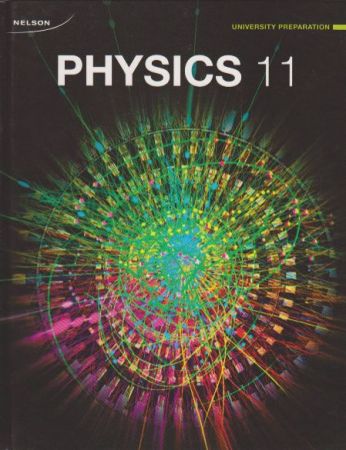Suppliers
Other Departments
Shop by Brand
More Information
.png)

Suppliers > Nelson Education Ltd.
Nelson Physics 11 University Preparation
Model: 9780176510374
The Nelson Physics 11 University Preparation - Student Textbook supports the Ontario Ministry of Education
Course: Physics, Grade 11, University Prepration, Course Code: SPH3U
Author Team: Maurice DiGiuseppe, Christopher T. Howes, Jacob Speijer, Charles Stwart, Henri M. van Bemmel, Rob Vucic, Victoria Wraight
It has these units and chapters:
Unit 1: Kinematics
Chapter 1: Motiion in a Straight Line
1.1 Distance, Position, and Displacement
1.2 Speed and Velocity
1.3 Acceleration
1.4 Comparing Graphs of Linear Motion
1.5 Five Key Equations for Motion with Uniform Acceleration
1.6 Acceleration Near Earth's Surface
1.7 Explore an Issue in Vehicle Safety: Election Speed Limiters for Teen Drivers
Investigation 1.2.1: Watch Your Speed
Investigation 1.4.1: Uniform Velocity
Investigation 1.4.2: Motion Down a Ramp
Chapter 2: Motion in Two Dimensions
2.1 Motion in Two Dimension - A Scale Diagram Approach
2.2 Motion in Two Dimension - An Algebraic Approach
2.3 Projectile Motion
2.4 Physics Journal: Galileo Galilei: Sixteenth-Century "New Scientist"
2.5 Explore Applications in Kinematics: Accelerometers: Accelerating Your Life
Investigation 2.3.1: Modelling Projectile Motion
Unit 2: Forces
Chapter 3: Newton's Laws of Motion
3.1 Types of Forces
3.2 Newton`s First Law of Motion
3.3 Newton`s Second Law of Motion
3.4 Newton`s Third Law of Motion
3.5 Using Newton`s Laws
3.6 Physics Journal: Galileo, Newton, and Hawking
Investigation 3.3.1: Investigatin Newton`s Second Law
Chapter 4: Applications of Forces
4.1 Gravitational Force Near Earth
4.2 Friction
4.3 Solving Friction Problems
4.4 Forces Applied to Automoitve Technology
4.5 Forces Applied to Sports and Research
4.6 Explore an Issus in Forces; Mandatory Snow Tires in the Winter?
Investigation 4.1.1: Acceleration Due to Gravity and Terminal Speed
Investigation 4.2.1: Factors That Affect Friction
Investigation 4.2.2: Coefficients of Friction
Investigation 4.3.1: Predicting Motion with Friction
Unit 3: Energy ad Society
Chapters 5: Work, Energy, Power, and Society
5.1 Work
5.2 Energy
5.3 Types of Energy and the Law of Conservation of Energy
5.4 Efficiency, Energy Sourcffes, and Energy Conservation
5.5 Power
5.6 Explore Applications of Renewable Energy Sources: Going Off the Grid
Investigation 5.2.1: Conservation of Energy
Investigation 5.5.1: Student Power
Chatper 6: Thermal Energy and Society
6.1 Warmth and Coldness
6.2 Heat
6.3 Heat Capacity
6.4 States of Matter and Changes of State
6.5 Heating and Cooling Systems
6.6 Explore and Issue in Thermal Energy: Geothermal System: Friend or Foe?
6.7 Physics Journal: When a Brewer Becomes a Scientist
Investigation 6.3.1: Specific Heat Capacity of Brass
Investigation 6.4.1: Heating Graph of Water
Investigation 6.4.2: Specific Latent Heat of Fusion for Ice
Chapter 7: Nuclear Energy and Society
7.1 Atoms and Isotopes
7.2 Radioactive Decay
7.3 Half-Life
7.4 Nuclear Fission and Nuclear Power Generation
7.5 Nuclear Fusion
7.6 Explore an Application of Nuclear Technology: Pest Control
Investigation 7.5.1: Nuclear Energy: Benefit or Hazard?
Unit 4: Waves and Sound
Chapter 8: Vibrations and Waves
8.1 What is a vibration?
8.2 Types of Mechanical Waves
8.3 Wave Characteristics
8.4 Determining Wave Speed
8.5 Properties of Sound Waves
8.6 Physics Journal: The Sound Barrier
8.7 Explore an Issue in Sound: Noise Pollution
Investigation 8.3.1: Investigating Vibrations
Investigation 8.4.1: Investigating Two-Dimensional Wave Motion
Investigation 8.5.1: Measuring the Speed of Sound
Chapter 9: Wave Interactions
9.1 Interference of Waves
9.2 Waves at Media Boundaries
9.3 Beats
9.4 Damping and Resonance
9.5 The Doppler Effect
9.6 Physics Journal: Rogue Waves
Investigations 9.2.1: Investigating Wave Speed on a String
Investigations 9.4.1: Investigating Standing Waves in an Air Column
Chapter 10: Applications of Waves
10.1 Human Hearing
10.2 Musical Instruments
10.3 Acoustics
10.4 Structural Safety
10.5 Seismic Waves
10.6 Vibrations in Aircraft
10.7 Nature and Sound Waves
Investigation 10.1.1: Investigation Frequency, Loudness, and Human Hearing
Investigation 10.2.1: Waveforms of Instruments
Investigation 10.3.1: Investigating Acoustic Surfaces
Unit 5: Electricity and Magnetism
Chapter 11: Electricity and Its Production
11.1 Electrical Energy and Power Plants
11.2 Explore and Issue in Generating Electricity: Clean Coal Technology
11.3 Electric Potential Difference
11.4 Physics Journal: Is Benjamin Franklin to Blame?
11.5 Electric Current
11.6 Kirchhoff's Laws
11.7 Electrical Resistance
11.8 Resistors in Circuits
11.9 Circuit Analysis
Investigation 11.8.1: Analyzing Curcuits
Chapter 12: Electromagnetism
12.1 Magnetic Fields
12.2 Oersted's Discovery
12.3 Physics Journal: Wireless Electricity
12.4 Solenoids
12.5 The Motor Principle
12.6 The Direct Current Motor
12.7 Explore Applications in Electromagnetism: Magnetic Resonance Imaging
Investigation 12.1.1: Properties of Magnetic Fields
Investigation 12.4.1: Magnetic Fields around Electromagnets
Investigation 12.6.1: Building and Investigating a Prototype Motor
Chapter 13: Electromagnetic Induction
13.1 Electromagnetic Induction
13.2 Lenz's Law
13.3 Alternating Current
13.4 Electricity Generation
13.5 Transformers
13.6 Power Plants and the Electrical Grid
Investigation 13.2.1: Investigating Electromagnetic Induction
For each chapter, there are Summary, Self-Quiz and Review.
For each unit, there are Task, Self-Quiz and Review.
Numerical and short answers are given at the end of the textbook.
Hardcover, 688 pages, book size: 22 cm x 28 cm. x 3.1 cm




